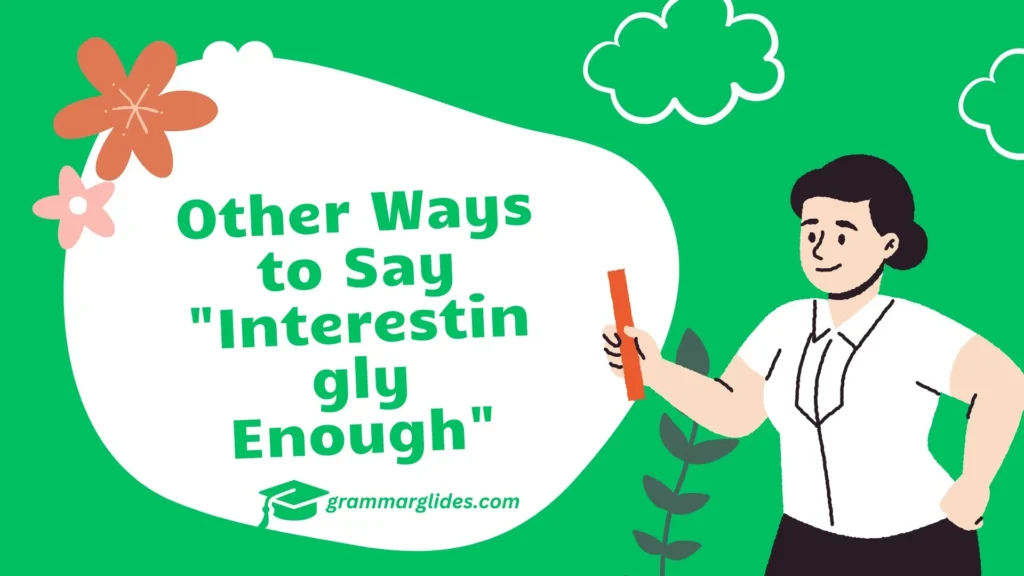“Sometimes, the right word can make a big difference in how you express yourself.”
When you want to convey that something is surprising, intriguing, or noteworthy, “interestingly enough” is a go-to phrase.However, there are numerous alternatives that can add variety and nuance to your communication.
Whether you’re writing an essay, having a conversation, or giving a presentation, it’s useful to know different ways to say “interestingly enough” to keep your language fresh and engaging.
In this article, we’ll explore other ways to say “interestingly enough”, with explanations and examples to help you use them in your daily conversations. By replacing overused phrases, you’ll improve the clarity and impact of your message. Let’s dive into these alternatives!
1. “Curiously”
Scenario: You’re talking about a strange event that happened while traveling.
Example 1: “Curiously, I found a vintage map at a yard sale in a small town.”
Example 2: “Curiously, the cat started playing with the ball all by itself.”
Explanation: “Curiously” highlights something unusual or strange that catches attention.
2. “What’s even more surprising is”
Scenario: You’re explaining a surprising discovery while doing research.
Example 1: “What’s even more surprising is that this ancient civilization had advanced technology.”
Example 2: “What’s even more surprising is that the team finished the project early.”
Explanation: This phrase adds an extra layer of surprise to the information you’re sharing.
3. “Interestingly”
Scenario: You’re sharing a fun fact about nature.
Example 1: “Interestingly, octopuses have three hearts.”
Example 2: “Interestingly, honey never spoils, even after thousands of years.”
Explanation: A simple replacement, “interestingly” is a direct way to introduce something that sparks curiosity.
4. “Surprisingly”

Scenario: You’re talking about an unexpected result from an experiment.
Example 1: “Surprisingly, the plant grew even without direct sunlight.”
Example 2: “Surprisingly, the weather was warm during winter.”
Explanation: “Surprisingly” indicates that something was unexpected or contrary to what was anticipated.
5. “To my surprise”
Scenario: You’re telling a friend about something that caught you off guard.
Example 1: “To my surprise, the concert tickets were still available last minute.”
Example 2: “To my surprise, she remembered my birthday after years of no contact.”
Explanation: This phrase shows that the speaker was personally taken aback by something.
6. “It’s fascinating to note that”
Scenario: You’re explaining something interesting you learned in history.
Example 1: “It’s fascinating to note that the Great Wall of China stretches over 13,000 miles.”
Example 2: “It’s fascinating to note that dolphins have been known to communicate with each other using sounds.”
Explanation: This emphasizes a fact that’s intriguing and adds depth to the conversation.
7. “What’s more interesting is”
Scenario: You’re talking about a topic that has many surprising details.
Example 1: “What’s more interesting is that the human brain has more connections than stars in the galaxy.”
Example 2: “What’s more interesting is that some species of frogs can freeze during winter and still survive.”
Explanation: This phrase draws attention to a particularly interesting or compelling fact.
8. “Strangely”
Scenario: You’re describing something odd that happened while you were out.
Example 1: “Strangely, the elevator stopped on the 5th floor even though no one pressed the button.”
Example 2: “Strangely, the dog didn’t bark when the doorbell rang.”
Explanation: “Strangely” emphasizes an event that feels unusual or hard to explain.
9. “Ironically”
Scenario: You’re pointing out something that contradicts expectations.
Example 1: “Ironically, the mechanic’s car broke down on the way to work.”
Example 2: “Ironically, the loudest person in the room was the least prepared for the presentation.”
Explanation: “Ironically” suggests that the situation is opposite to what you’d expect, often with a humorous twist.
10. “Unbelievably”
Scenario: You’re telling someone about a wild story that’s hard to believe.
Example 1: “Unbelievably, he climbed the entire mountain in just one day!”
Example 2: “Unbelievably, they found a dinosaur footprint during a routine dig.”
Explanation: “Unbelievably” emphasizes that the fact is so extraordinary, it’s almost hard to accept.
11. “Notably”
Scenario: You’re emphasizing an important point in a discussion.
Example 1: “Notably, the team achieved the highest score ever in the history of the game.”
Example 2: “Notably, the company’s profit grew by 50% last year.”
Explanation: “Notably” draws attention to something significant or worthy of mention.
12. “It’s worth noting that”
Scenario: You’re highlighting a key fact in a presentation.
Example 1: “It’s worth noting that the Eiffel Tower was originally intended to be temporary.”
Example 2: “It’s worth noting that the longest river in the world is the Nile, not the Amazon.”
Explanation: This phrase emphasizes an important or interesting detail that adds value to the topic.
13. “Unquestionably”
Scenario: You’re making a statement that is undeniably true.
Example 1: “Unquestionably, the chef is one of the best in the city.”
Example 2: “Unquestionably, this is the most beautiful beach I’ve ever visited.”
Explanation: “Unquestionably” means something is beyond doubt, and it underscores a clear fact or opinion.
14. “To emphasize”
Scenario: You’re stressing a particularly important part of your argument.
Example 1: “To emphasize, the results were not just good, they were exceptional.”
Example 2: “To emphasize, I want to remind you that today is the last day to register.”
Explanation: “To emphasize” shows you are pointing out something with greater importance or intensity.
15. “It’s fascinating”
Scenario: You’re discussing a discovery that grabbed your attention.
Example 1: “It’s fascinating how some animals can navigate long distances without getting lost.”
Example 2: “It’s fascinating to think about how far technology has come in just a few decades.”
Explanation: “It’s fascinating” is used when describing something that is interesting and captures the speaker’s curiosity.
Other Ways to Say “It Was a Pleasure Speaking with You”
16. “Remarkably”
Scenario: You’re describing something impressive or unexpected.
Example 1: “Remarkably, she finished the marathon despite being injured.”
Example 2: “Remarkably, the ancient city was perfectly preserved after thousands of years.”
Explanation: “Remarkably” indicates something is unusual in a positive way, often surprising or impressive.
17. “Incredibly”
Scenario: You’re telling a story about something extraordinary that happened.
Example 1: “Incredibly, the young artist painted a masterpiece in just one day.”
Example 2: “Incredibly, they managed to fix the car with just duct tape and a screwdriver.”
Explanation: “Incredibly” emphasizes how amazing or unbelievable the event is.
18. “Amazingly”
Scenario: You’re talking about something that is truly remarkable.
Example 1: “Amazingly, they completed the project ahead of schedule.”
Example 2: “Amazingly, the child learned to read by the age of three.”
Explanation: “Amazingly” emphasizes the wonder or surprise of an achievement or event.
19. “Interestingly enough”
Scenario: You’re sharing a fact that may surprise others.
Example 1: “Interestingly enough, the first computer was as big as a room.”
Example 2: “Interestingly enough, the shortest war in history lasted only 38 minutes.”
Explanation: “Interestingly enough” is used to introduce a surprising or unusual fact.
20. “As it turns out”
Scenario: You’re telling someone about a surprising outcome or revelation.
Example 1: “As it turns out, the man we met was actually a famous actor.”
Example 2: “As it turns out, the project was completed under budget.”
Explanation: This phrase is used when the results of a situation or event are different from what was expected.
21. “I find it surprising that”
Scenario: You’re sharing your personal surprise about something.
Example 1: “I find it surprising that they managed to build a bridge in just a few months.”
Example 2: “I find it surprising that she was able to solve the puzzle so quickly.”
Explanation: This phrase emphasizes personal surprise or disbelief about something.
22. “It’s worth mentioning that”
Scenario: You’re pointing out something that adds value to your discussion.
Example 1: “It’s worth mentioning that the company also offers a free trial for new customers.”
Example 2: “It’s worth mentioning that the event was a huge success despite the rain.”
Explanation: This phrase helps highlight a relevant or important piece of information.
23. “Not surprisingly”
Scenario: You’re discussing a predictable outcome.
Example 1: “Not surprisingly, she passed the exam with flying colors.”
Example 2: “Not surprisingly, the restaurant was full on Valentine’s Day.”
Explanation: This phrase emphasizes that the outcome was expected or logical.
24. “It is interesting to note that”
Scenario: You’re bringing attention to an interesting or noteworthy fact.
Example 1: “It is interesting to note that some birds can navigate using the Earth’s magnetic field.”
Example 2: “It is interesting to note that the first modern Olympic Games were held in 1896.”
Explanation: This phrase is used to highlight a unique or intriguing detail.
25. “In an interesting twist”
Scenario: You’re discussing a surprising or unexpected turn of events.
Example 1: “In an interesting twist, the villain turned out to be the hero’s long-lost sibling.”
Example 2: “In an interesting twist, the underdog team won the championship.”
Explanation: This phrase introduces a surprising or unexpected event that adds intrigue to the story.
26. “Unexpectedly”
Scenario: You’re telling someone about something that happened out of the blue.
Example 1: “Unexpectedly, the concert was canceled due to weather conditions.”
Example 2: “Unexpectedly, the quiet student was the one to present the most powerful idea.”
Explanation: “Unexpectedly” highlights something that occurs without warning or anticipation.
27. “It’s curious to think that”
Scenario: You’re discussing an unusual or odd idea.
Example 1: “It’s curious to think that some fish can live for over 100 years.”
Example 2: “It’s curious to think that the internet wasn’t even invented a few decades ago.”
Explanation: This phrase highlights thoughts or facts that provoke curiosity or wonder.
28. “To my amazement”

Scenario: You’re talking about something that astounded you.
Example 1: “To my amazement, the magician made the entire car disappear.”
Example 2: “To my amazement, they managed to solve the issue without any outside help.”
Explanation: “To my amazement” shows that you were surprised or shocked by something.
29. “Oddly enough”
Scenario: You’re describing something that doesn’t quite make sense.
Example 1: “Oddly enough, she arrived just as the event was ending.”
Example 2: “Oddly enough, I found my keys in the refrigerator.”
Explanation: “Oddly enough” introduces something unusual or out of the ordinary.
30. “It’s astonishing”
Scenario: You’re describing something that amazes or shocks you.
Example 1: “It’s astonishing how much progress has been made in medicine in the last 50 years.”
Example 2: “It’s astonishing that such a small device can hold so much data.”
Explanation: “It’s astonishing” emphasizes something that is very impressive or surprising.
Can using alternatives to “Interestingly enough” improve my writing style?
Yes, using a variety of expressions instead of “Interestingly enough” can enhance your writing style. It shows your ability to vary language and make your writing more dynamic. It also helps you avoid repetition, keeping your audience engaged. The key is to choose the phrase that best fits the tone and context of your message, which can make your communication more effective and professional.
Key Insight
1. Why should I use alternatives to “Interestingly enough”?
Using alternatives to “Interestingly enough” helps diversify your language, making your writing or speech more engaging and less repetitive. It also allows you to tailor your expression to better match the tone and context of what you’re discussing.
2. Can “Interestingly enough” be used in formal writing?
While “Interestingly enough” is often used in informal settings, some alternatives like “It’s worth noting” or “Notably” are more suited for formal writing. It’s always best to choose the phrasing that fits the tone of your writing.
3. How can I sound more professional while using phrases similar to “Interestingly enough”?
You can sound more professional by choosing phrases such as “It’s noteworthy that,” “Notably,” or “To highlight.” These phrases carry a formal tone but still express a similar idea as “Interestingly enough.”
4. Can I use “Interestingly enough” in everyday conversations?
Yes, “Interestingly enough” is perfect for everyday conversations when you want to highlight something surprising or noteworthy. It can help grab attention and make your point more memorable.
5. How can I incorporate alternatives into my writing effectively?
To incorporate alternatives into your writing, consider the tone and context. Choose more casual alternatives for informal settings (like “Surprisingly” or “It’s fascinating”) and more formal alternatives (such as “Notably” or “It’s worth mentioning”) for professional or academic writing.
Conclusion
In conclusion, there are many ways to replace “interestingly enough” to add variety and precision to your language. Whether you’re discussing something surprising, curious, or remarkable, using these alternatives can enhance your communication.E
ach phrase provides a unique way to highlight important details and keep your audience engaged. Next time you need to express intrigue or surprise, try switching things up with these alternatives for a more dynamic and engaging conversation!

Hi! I’m Lauren Reynolds, the author of Grammar Glides. I create easy-to-follow content that helps you master English with confidence. Let’s make learning English simple and enjoyable together!

